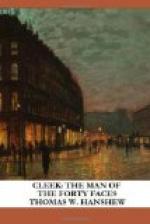Cleek, too, was delighted when he saw them. It was nothing to him that the notes they contained were of the briefest—mere records of the state of the weather, the progress of his little lordship, the fact that Lady Chepstow wished to be remembered and that the writer was well “and hoped he, too, was.” They were written by her—that was enough. He gave so much that very little sufficed him in return; and the knowledge that he had been in her mind for the five or ten minutes which it had taken to write the few lines she sent him, made him exceedingly happy.
But she was not his only correspondent in these days—not even his most frequent one. For a warm, strong friendship—first sown in those ante-Derby days—had sprung up between Sir Henry Wilding and himself and had deepened steadily into a warm feeling of comradeship and mutual esteem. Frequent letters passed between them; and the bond of fellowship had become so strong a thing that Sir Henry never came to town without their meeting and dining together.
“Gad! you know, I can’t bring myself to think of you as a police-officer, old chap!” was the way Sir Henry put it on the day when he first invited him to lunch with him at his club. “I’d about as soon think of sitting down with one of my grooms as breaking bread with one of that lot; and I shall never get it out of my head that you’re a gentleman going in for this sort of thing as a hobby—never b’Gad! if I live to be a hundred.”
“I hope you will come nearer to doing that than you have to guessing the truth about me,” replied Cleek, with a smile. “Take my word for it, won’t you?—this thing is my profession. I don’t do it as a mere hobby: I live by it—I have no other means of living but by it. I am—what I am, and nothing more.”
“Oh, gammon! Why not tell me at once that you are a winkle stall-keeper and be done with it? You can’t tell a fish that another fish is a turnip—at least you can’t and expect him to believe it. Own up, old chap. I know a man of birth when I meet him. Tell me who you are, Cleek—I’ll respect it.”
“I don’t doubt that—the addition is superfluous.”
“Then who are you? What are you, Cleek? Eh?”
“What you have called me—’Cleek.’ Cleek the detective, Cleek of the Forty Faces, if you prefer it; but just ‘Cleek’ and nothing more. Don’t get to building romances about me merely because I have the instincts of a gentleman, Sir Henry. Just simply remember that Nature does make mistakes sometimes; that she has been known to put a horse’s head on a sheep’s shoulders and to make a navvy’s son look more royal than a prince. I am Cleek, the detective—simply Cleek. Let it go at that.”
And as there was no alternative, Sir Henry did.
It made no difference in their friendship, however. Police officer or not, he liked and he respected the man, and made no visit to town without meeting and entertaining him.




